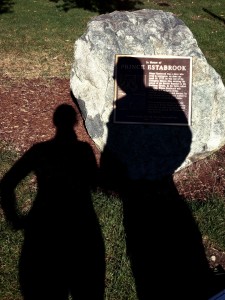In celebration of my triumph, my beaux took me to see a show this weekend. And not just any show. A SHAKESPEARE show. A show that we’ve both been dying to see for some time now and which displayed great promise in its advertised concept.
The new-to-Boston Anthem Theatre Company performed a four-man Comedy of Errors at the BCA Plaza blackbox. At ninety minutes with no intermission and some creative application of props/costumes, it was a high-octane performance with great entertainment value.
Unfortunately, the performance was (for me) overshadowed by an egregious lack of judgment on the part of the production company.
I’ve always thought that a program bio for a dead playwright was a bit odd. Granted, sometimes it contains useful information for an audience (especially if the show is meant to be an “introduction to [playwright]” for a crowd who wouldn’t normally see this type of theatre). It makes slightly more sense when there’s a dramaturge working on a production with expertise in the subject matter who can craft a bio with good/entertaining tidbits.
Anthem, however, made a cardinal mistake: they copy and pasted from the internet.
The bio in their playbill is attributed to http://www.biographyonline.net/poets/william_shakespeare.html and has all the usual axioms about Shakespeare. The piece which bothered me most was this paragraph:
“Shakespeare died in 1664; it is not clear how he died although his vicar suggested it was from heavy drinking.”
At first I couldn’t tell if this was a joke. The timbre of the show was irreverent; maybe this was some sort of wink to that. A little investigation brought me to realize what was going on here: the error is reprinted verbatim from its source. The issue wasn’t purposeful, it was simply a careless copy job.
First of all; Shakespeare died in 1616. He was born in 1564. The playbill misprint is likely

doesn’t it look like we’re private eyes in a noir movie?
a transcription error on the part of biographyonline.net which was propagated by simply cutting and pasting the bio without fact-checking it.
It’s almost the first thing I tell my students when they walk into my class: never copy and paste off the internet. And certainly don’t do so without a bit of investigation of your own. One google search would have divested the truth about Shakespeare’s death date to whomever curated this playbill.
The bit about heavy drinking was a fairy tale I hadn’t heard before. After some poking around, I see that (like so much else about Shakespeare’s life) it’s a reasonably common myth with an unclear origin; certainly not canonical fact, and not something that I would include in a reliable bio.
Why was I so enraged at this incident, you may ask? Because first of all it undermines the authority of the work. How am I supposed to trust that these people know anything about Shakespeare? How am I supposed to respect the hard work of the actors/company if I can see that their playbill is thrown together by someone who simply doesn’t know any better and hasn’t bothered to find out? What do they have to contribute to this conversation, or teach to an audience of Shakespeare-beginners, if they can’t get their basic facts straight?
The second reason that this made me angry was that it didn’t have to be a problem. If the company wanted a dramaturge (or even just someone to write a smart playbill note), all they had to do was send one e-mail to any theatre department in the Boston area. Said department, I can nearly guarantee, would have had a student willing to work on this project for free. Suddenly, the company is engaged in a mutually beneficial relationship with a scholar; the dramaturge gets a resume byline, and the company gets an accurate piece of micro-scholarship. Problem: more than solved. And no fuss/no muss.
Really, this hits at the heart of an issue near and dear to my heart. If scholarship can’t feed and serve practice, then what’s the point of scholarship? And if practice refuses to acknowledge scholarship, then how can it serve its purpose? Without a healthy dialogue between the two, we’re stuck in a combined death-spiral to mutual-but-separate oblivions.
It baffles me even more that companies who do classical work seem less likely to hire dramaturges than companies who do contemporary work. Wouldn’t you think that a company who specialized in Shakespeare would want someone around who knows the ins/outs/back ends/front ends/historical tidbits/correct pronunciation intimately? Or how about a company that generally does contemporary plays but is taking a dip into the Shakes-world; wouldn’t you think they would want someone to converse with about any questions they may have even more?
So long as we continue to put our hands over our ears and sing loudly to ourselves that our work is the only legitimate work, we will not grow as a community. Without understanding and helping each other, we risk stagnation as artists and scholars. So please, for the love of all things bardy, hire (or at least consult) a dramaturge. If you find a good one, I promise that your work (and theirs!) will benefit from it.

